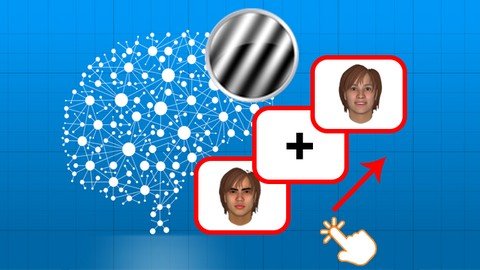
Published 4/2024
MP4 | Video: h264, 1920x1080 | Audio: AAC, 44.1 KHz
Language: English | Size: 1.40 GB | Duration: 3h 52m
A Course on Cognitive Task Design with PsychoPy
What you'll learn
Foundations of Cognitive Tasks: Gain a comprehensive understanding of cognitive tasks, including a brief history, mental chronometry, and the anatomy of tasks.
Paradigms in Cognitive Experiments: Explore key paradigms like Go/NoGo, Oddball and Stroop.
Experiment Building with Psychopy: Acquire hands-on experience with Psychopy, from installation to creating your first experiment.
Integrating Psychopy with EEG and fMRI Devices: Students will gain proficiency in connecting Psychopy to EEG (Electroencephalography) and fMRI.
Requirements
This is an introductory course for beginners. No programming or preinstalled software is needed. The only required software includes Psychopy and FaceGen Modeller, both of which will be demonstrated how to install during the course. The course will focus on Builder View of the software. The only thing you need is a keyboard and a mouse and also a curious mind.
Description
This comprehensive course will help you get the full potential of PsychoPy for psychology and neuroscience experiments. Whether you're a beginner or an expert, this course equips you with the knowledge and skills needed to excel. This course is suited for: Beginners in psychology, cognitive neuroscience, and neuroscience who want to design and conduct experiments using PsychoPy's Builder View. Professionals and researchers aiming to enhance their skills in experimental design and implementation.This is an introductory course for beginners. No programming or preinstalled software is needed. The only required software includes Psychopy and FaceGen Modeller, both of which will be demonstrated how to install during the course. The course will focus on Builder View of the software. The only thing you need is a keyboard and a mouse and also a curious mind.Following the foundations, the course explores "Paradigms in Cognitive Experiments," where students will study prominent paradigms such as the Go/NoGo, Oddball, and Stroop tasks. These paradigms are crucial for understanding cognitive processing and are widely used in both psychological and neuroscientific research. The module covers the psychological and neuroscientific basis of these paradigms, their clinical relevance, and the theories underlying each, providing a comprehensive view of how these experiments are pivotal in cognitive research.A practical component of the course is "Experiment Building with PsychoPy," where students get hands-on experience with PsychoPy software, from installation to creating their first experiment. This section teaches how to set up experimental conditions, present stimuli, record responses, and analyze the results, offering a complete toolkit for conducting cognitive psychology experiments.The course also includes a segment on "Specialized Experiments," focusing on advanced topics such as utilizing facial images for social experiments with tools like FaceGen Modeller. Furthermore, students will learn to integrate PsychoPy with EEG (Electroencephalography) and fMRI (Functional Magnetic Resonance Imaging) devices, a skill that greatly expands the scope of their research capabilities by incorporating neuroimaging techniques.Enroll now to master experimental design with PsychoPy!
Overview
Section 1: Introduction to cognitive tasks
Lecture 1 A short history
Lecture 2 True mental chronometry
Lecture 3 The Anatomy of a task
Section 2: Important paradigms in cognitive experiments
Lecture 4 Intro to GoNogo Paradigm
Lecture 5 GoNogo Parameters
Lecture 6 Neuroscience of GoNogo
Lecture 7 GoNogo in Clinical Research
Lecture 8 Intro to Oddball Paradigm
Lecture 9 Neuroscience of Oddball
Lecture 10 Intro to Stroop Paradigm
Lecture 11 Neuroscience and Theories of Stroop
Section 3: Start working with PsychoPy
Lecture 12 Psychopy Installation
Lecture 13 An overview of Psychopy
Lecture 14 Sketch of the Experiment
Lecture 15 Setting-up the conditions file
Lecture 16 Presenting simple text on the screen
Lecture 17 Presenting simple text on the screen
Lecture 18 Iterating over trials
Lecture 19 Adding ISIs (Inter-trial intervals)
Lecture 20 Presenting and recording based on the conditions
Lecture 21 Introduction and end pages
Lecture 22 Review the results
Section 4: Using facial images for a social experiment
Lecture 23 Intro to a facial emotion experiment
Lecture 24 Intro to FaceGen Modeller
Lecture 25 Creating emotional face stimuli
Lecture 26 Setting-up the conditions file
Lecture 27 Presenting the images and recording responses
Lecture 28 Setting the background and stimuli size
Lecture 29 Creating masks for facial images
Lecture 30 Adding movie clips
Section 5: Stimuli changes on the screen
Lecture 31 Stimuli change considering size and position
Lecture 32 Color changes
Section 6: Creating ratings and questionaries
Lecture 33 The PANAS rating
Lecture 34 Create conditions file for scales
Lecture 35 Using sliders for the scales
Lecture 36 Mental number line task
Lecture 37 MNL task with slider
Lecture 38 Creating conditions of questionnaire
Lecture 39 Using form responses
Lecture 40 Button for submission of form
Section 7: Integrating Psychopy with EEG and fMRI
Lecture 41 What are triggers
Lecture 42 Sending EEG triggers
Lecture 43 Integrating with fMRI device
Lecture 44 Using PsychoPy Demos and last words
Section 8: Materials
Lecture 45 Materials
Lecture 46 Factial Emotion
Lecture 47 Ratings and Questionnaires
Section 9: Bonus Lecture
Lecture 48 Bonus
This course is designed for beginners in the fields of psychology, cognitive neuroscience, and neuroscience who aspire to independently design and conduct experiments using PsychoPy Builder View. It is also suitable for experts looking to enhance their skills in experimental design and implementation.
Screenshots
https://fikper.com/Un13qth7Ys/Mastering_PsychoPy_for_Psychology_and_Neuroscience.part2.rar.html
https://rapidgator.net/file/4d8c4e438c0d5dc64a0e18d7f6261daa/Mastering_PsychoPy_for_Psychology_and_Neuroscience.part1.rar.html
https://rapidgator.net/file/fe1708d2d8144d19c0e4f3b50cce2557/Mastering_PsychoPy_for_Psychology_and_Neuroscience.part2.rar.html

